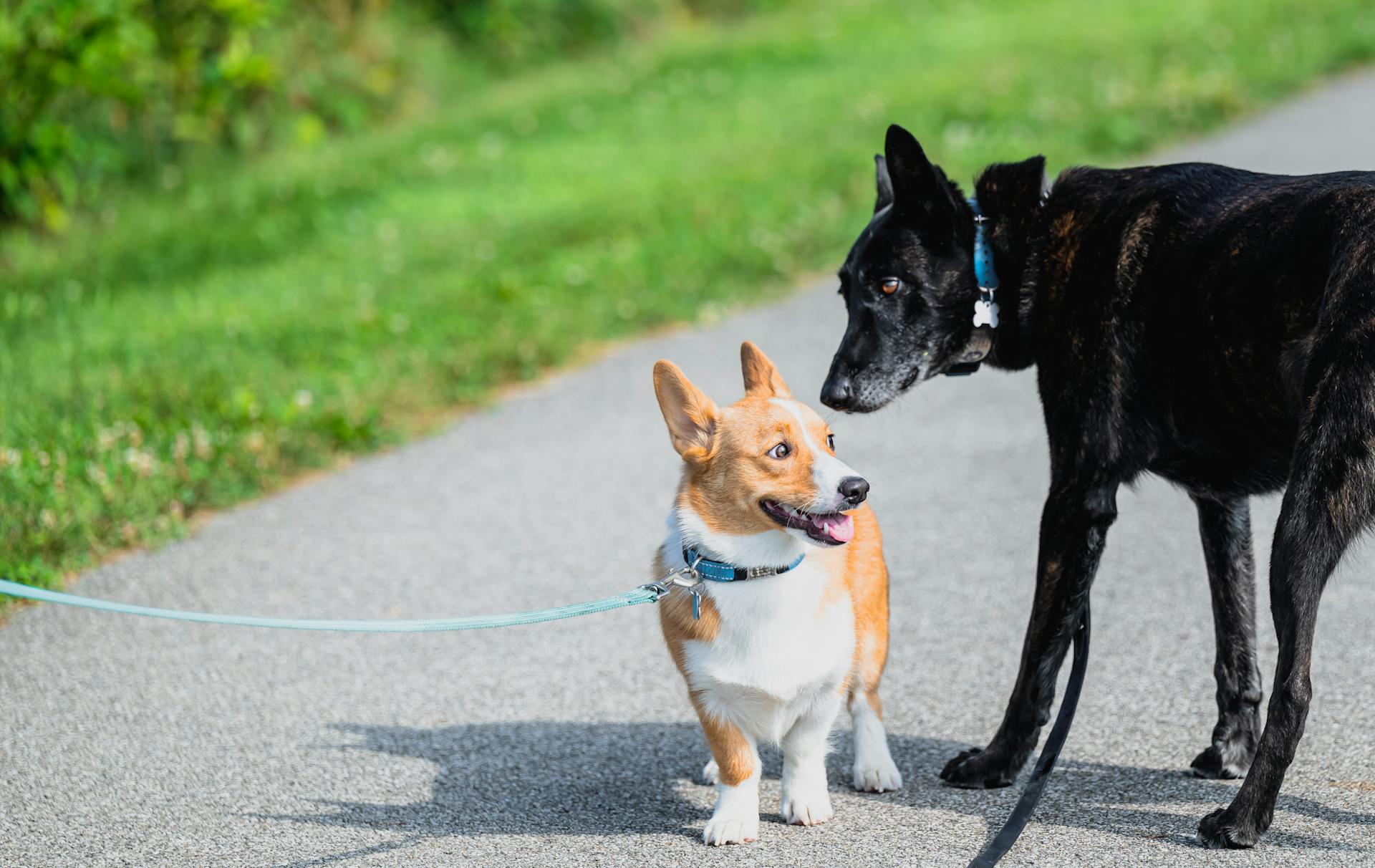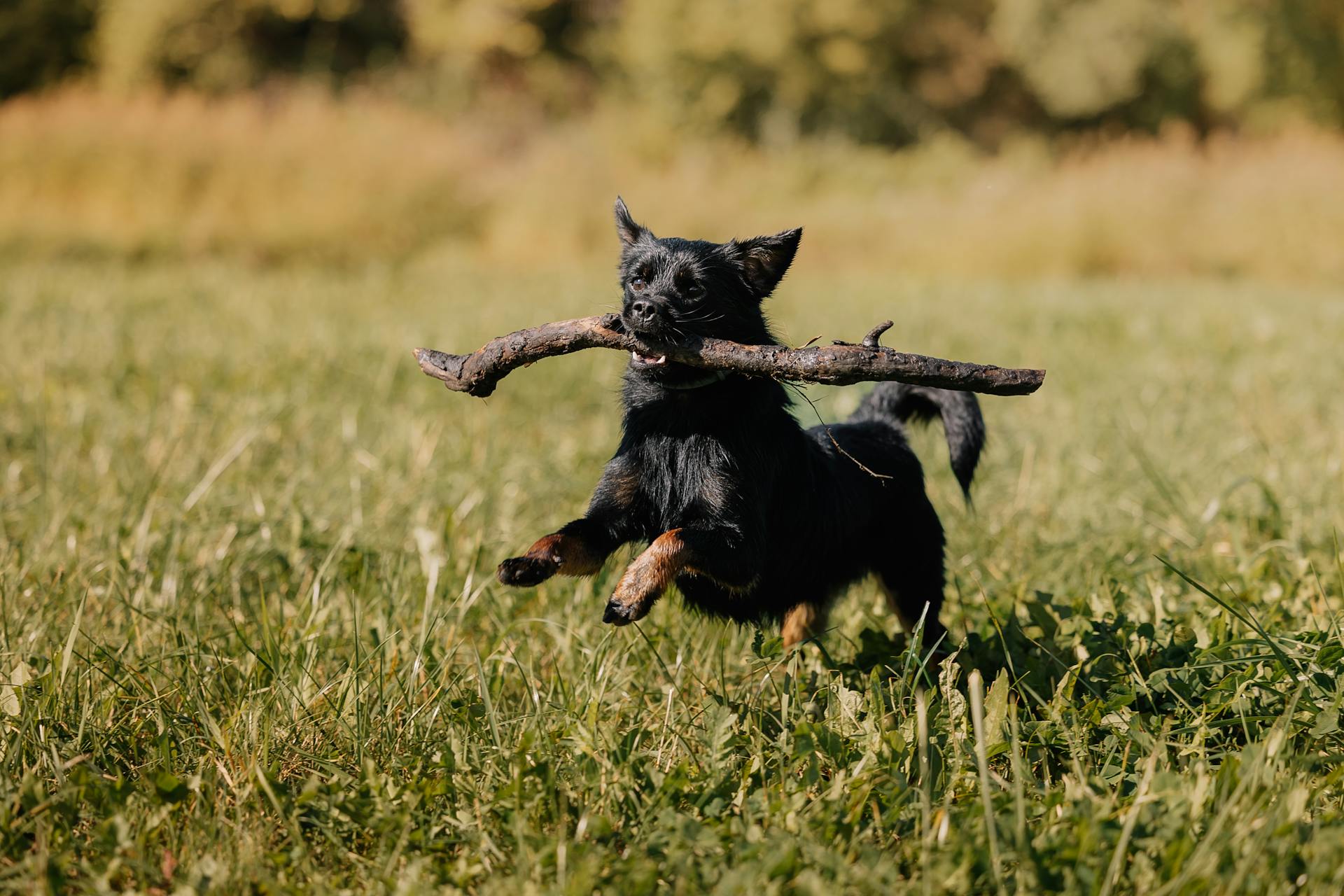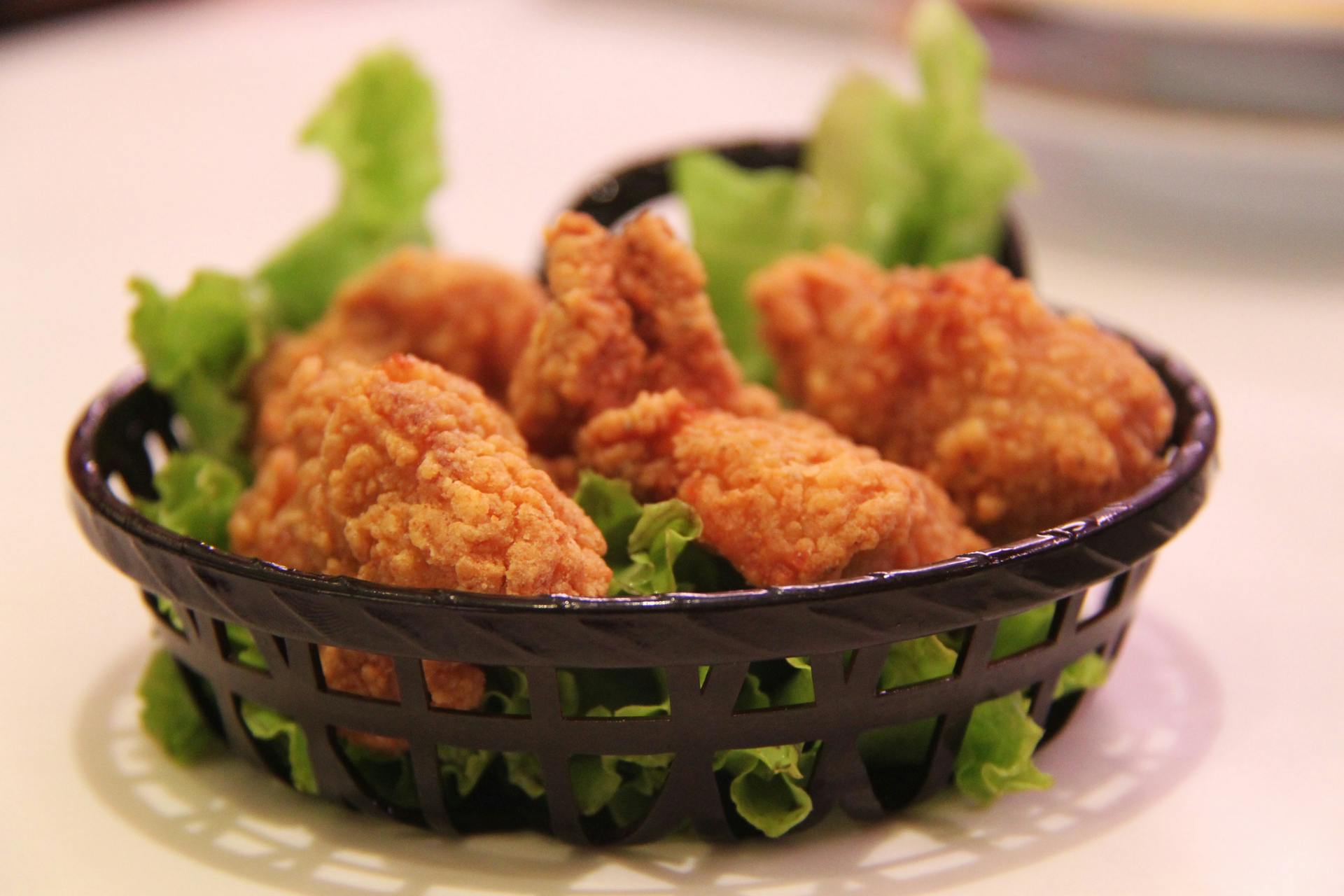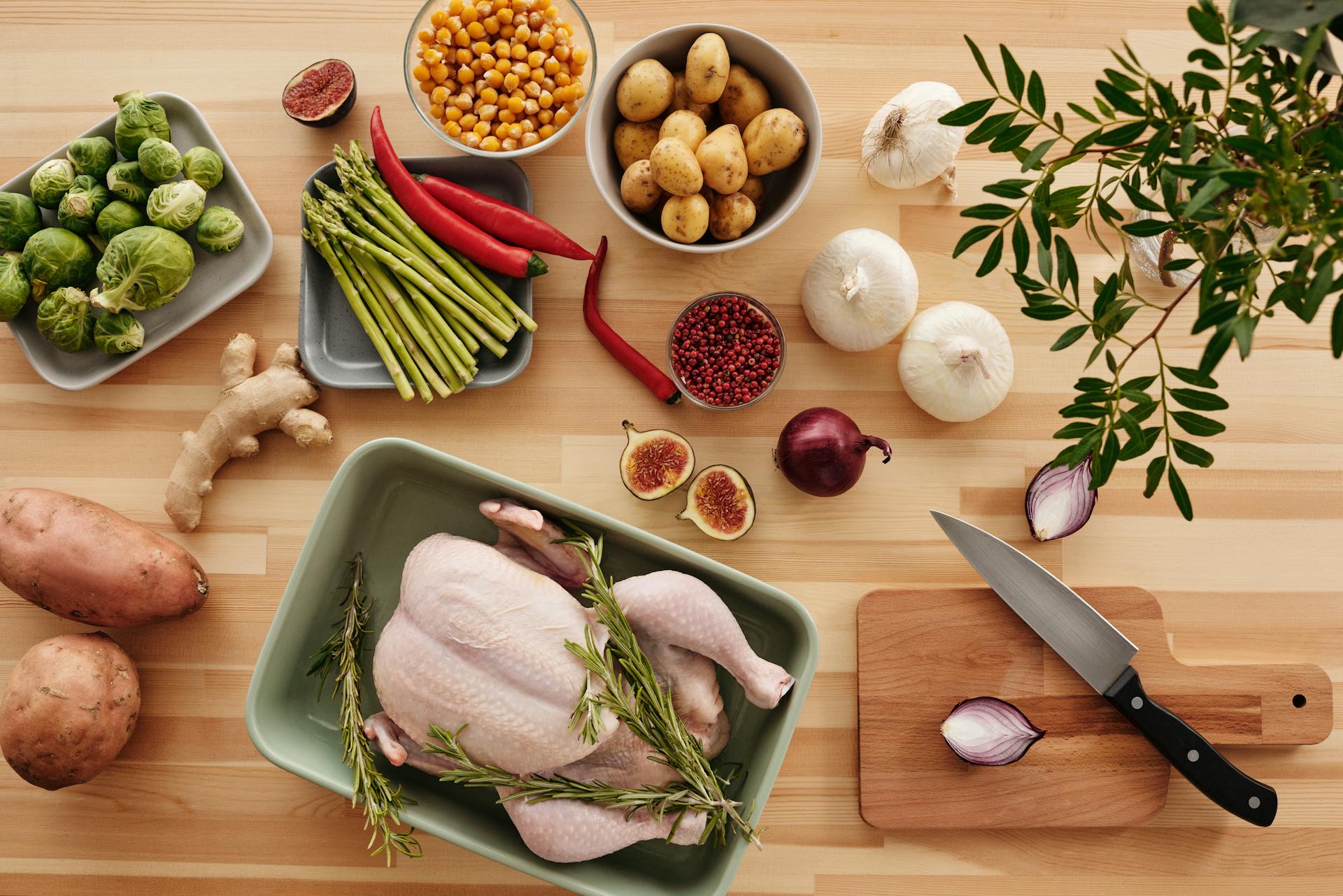
Feeding your dog raw chicken can be a nutritious choice, but it's essential to do it safely.
Raw chicken can be a great source of protein for dogs, containing essential amino acids like arginine and glutamic acid.
However, there's a risk of bacterial contamination, especially from Salmonella and Campylobacter.
These bacteria can cause serious illness in dogs, so it's crucial to handle raw chicken carefully.
Can Dogs Eat Raw Chicken?
Dogs can eat raw chicken, but it's not always a good idea. In fact, raw chicken is usually more dangerous for people than pets, but it can still sicken dogs, especially old, young, or immunocompromised ones.
Incidental ingestion of a bite or two of raw chicken will rarely cause serious illness, but it's still worth watching your dog closely and giving your vet a ring to be on the safe side. Most dogs will simply suffer from diarrhea for a day or two.
The real problem with raw chicken isn't the chicken itself, but the bacteria living on it. Salmonella, E. coli, and Campylobacter are a few of the most serious threats, and they're the ones most likely to sicken your dog.
Some dogs may experience minor intestinal disturbances, like vomiting or diarrhea, in the hours or days following a raw-chicken incident. But if these symptoms resolve within a day or two and your dog appears fine in all other respects, veterinary attention is probably unnecessary.
However, if your dog manages to swallow any bones, you'll need to ensure she isn't choking and keep your fingers crossed that the bones won't cause an obstruction. Intestinal obstructions are a veterinary emergency, and they may necessitate surgery.
Here are some key things to keep in mind if your dog eats raw chicken:
- Watch your dog closely for any symptoms, especially if she's old, young, or immunocompromised.
- Monitor her for minor intestinal disturbances, like vomiting or diarrhea.
- Check for any signs of choking or obstruction if she swallows bones.
- Give your vet a ring if you're concerned or if symptoms persist.
The Dangers of Raw Chicken
Feeding raw chicken to your dog can put them at a greater risk of developing Salmonella, E. coli, or another bacterial infection.
Raw chicken carries more risk than cooked meat because pathogens and bacteria like Salmonella are destroyed by the heat from the cooking process, and can therefore remain present in raw meat.
Dogs are generally much less susceptible to Salmonella than humans, but there is still a risk to be aware of.
To keep your dog and family safe, it's essential to maintain excellent food handling habits and follow proper kitchen hygiene.
Here are some key tips to minimize the risk of bacterial contamination:
- Safe handling and storage: Always keep raw meat separate from other foods to prevent cross-contamination.
- Good kitchen hygiene: Cleanliness is crucial. Sanitize all food surfaces, bowls, and utensils. Regularly wash your hands before and after handling raw meat.
Health Concerns
Feeding raw chicken to your dog can put them at a greater risk of developing bacterial infections like Salmonella, E. coli, or another bacterial infection.
Salmonella is the most common cause of food poisoning, and it's present on many foods that are uncooked or undercooked, including chicken. The bacteria can be found in the intestines or feces of animals and is not safe to consume.
If your dog eats raw chicken, they may show signs of salmonellosis, including vomiting, diarrhea, lethargy, lack of appetite, and fever. These symptoms can be fatal if your dog has a poor immune system or severe dysbiosis of the gut.
- Diarrhea, often severe in nature, sometimes bloody
- Vomiting
- Lethargy or fatigue
- Lack of appetite, sometimes with weight loss
- Fever
- Dehydration
In some cases, even healthy dogs can fall ill from eating raw chicken, especially if they ingest a large amount or have a compromised immune system.
Campylobacteriosis
Campylobacteriosis is a serious concern when it comes to raw chicken consumption in dogs. Raw chicken often contains the bacteria campylobacter, which can sicken dogs who consume the raw poultry.
Campylobacter poisoning often appears as signs of digestive distress, including diarrhea, abdominal pain, bloody poop, and fever. Diarrhea is the primary sign of infection and can last between five and 15 days for dogs older than 6 months.
If your dog has consumed raw chicken and is showing symptoms, it's essential to take them to the vet for a proper diagnosis. Your veterinarian can diagnose campylobacteriosis, though it may require you bringing in a stool sample for testing.
Antibiotics can help your dog feel better along with supportive care (like IV therapy). If you suspect your dog has ingested raw chicken, it's always better to err on the side of caution and consult with your veterinarian.
Here are some common symptoms of campylobacteriosis in dogs:
- Diarrhea
- Abdominal pain
- Bloody poop
- Fever
Considerations Before Giving Your Dog
Feeding your dog raw chicken can be a concern, especially when it comes to their health. Raw chicken can contain bacteria like Salmonella, E. coli, and Campylobacter, which can cause severe illness in dogs.
Some dogs may not get sick from eating raw chicken, but it's not a guarantee. Factors like the amount of chicken consumed, the dog's size, and their overall health can affect the outcome.
Dogs have a relatively short digestive tract, which doesn't give bacteria much time to cause harm. Additionally, their stomach acid is stronger than humans, which can help kill bacteria. However, this isn't a foolproof defense, and some dogs can still get sick.
It's worth noting that dogs have different bacteria living in their intestinal tracts than humans do, which may provide them with additional protection. These beneficial bacteria can outcompete pathogenic bacteria, minimizing negative symptoms.
If your dog eats raw chicken, monitor them closely for signs of distress, such as vomiting, diarrhea, lethargy, lack of appetite, fever, and dehydration. If you notice any of these symptoms or if your dog is showing signs of choking, intestinal obstruction, paralysis, or other concerning behavior, seek veterinary attention immediately.
Consider reading: Reasons Why Dogs Stop Eating
Here are some signs that necessitate veterinary attention:
- Signs of choking (wheezing, difficulty in breathing, coughing, panicking, etc.)
- Signs of intestinal obstruction, including severe abdominal pain, inability to defecate, or rectal bleeding.
- Paralysis
- Fever
- Diarrhea or vomiting that lasts more than 24 to 48 hours
- Inappetence (loss of appetite)
- Swollen or rigid belly
- Pacing or other signs of panic
If you're unsure about what to do, consult with your veterinarian or consider getting help from a virtual-chat service like JustAnswer.
Feeding and Nutrition
Feeding raw chicken to your dog can be a great way to provide them with essential nutrients, but it's crucial to do it safely and responsibly. Raw chicken is rich in protein, potassium, phosphorus, magnesium, vitamin B12, and other nutrients that are beneficial to dogs.
To ensure your dog gets all the required nutrients, consult with your veterinarian about at-home recipes or a veterinarian boarded in nutrition who can help formulate a complete and balanced diet.
Many veterinarians recommend against feeding your dogs any raw meat, but if you decide to feed your dog a raw food diet, make sure you work with your veterinarian to ensure your dog gets all their required nutrients. Moderation is key, even with healthy food like plain, boiled chicken.
Feeding your dog cooked chicken is a much better option than raw chicken, and it's a staple for bland diets fed to sickly dogs. When cooking chicken for your dog, make sure you're feeding a vet-recommended amount and don't add any seasoning, butter, or flavoring.
If you still don't want to feed your dog kibble, you can definitely feed your dog a homemade diet, though it will be much more work than simply opening a bag of dog food. Your veterinarian will help you craft a specific diet your dog's needs.
Is Good for Raw Chicken?
Feeding your dog raw chicken can have some amazing benefits. Research from The University of California, Davis suggests that it supports the development of a glossier coat with improved luster and texture.
Raw chicken contains glucosamine and chondroitin, which are believed to support joint health. Omega-3 fatty acids in raw chicken offer anti-inflammatory properties that have been reported to support joint health as well.
Dogs can digest raw meat more easily, which is attributed to the fact that it contains no processed ingredients or fillers that might cause gastrointestinal issues.
Feeding raw chicken can lead to less frequent and less smelly stools. This is a common result of feeding raw, according to raw feeding enthusiasts.
Raw feeding enthusiasts believe that dogs have an increased likelihood of finding relief from allergies and food sensitivities when they eat raw, unprocessed meat that’s free of allergens commonly found in commercially-processed dog food.
On a similar theme: What Is a Raw Food Diet for Dogs
Benefits of Feeding
Feeding your dog a raw chicken diet can have several benefits. Raw chicken is rich in protein and provides essential nutrients like potassium, phosphorus, magnesium, vitamin B12, and other beneficial compounds.
Dogs have evolved from wolves that only ate raw meat, and their digestive system is designed to handle it. Raw chicken can support the development of a glossier coat with improved luster and texture.

Raw chicken contains glucosamine and chondroitin, which support joint health. These nutrients are found in the cartilage and connective tissues of chicken.
Feeding your dog raw chicken can also provide anti-inflammatory properties, thanks to the omega-3 fatty acids it contains. This can be beneficial for joint health and overall well-being.
Raw chicken can be easier for dogs to digest than processed dog food. This is because it contains no fillers or processed ingredients that might cause gastrointestinal issues.
If you decide to feed your dog a raw chicken diet, make sure to work with your veterinarian to ensure your dog gets all the required nutrients. They can help create a complete and balanced diet for your pet.
Here are some key nutrients found in raw and cooked chicken:
- High-quality proteins for muscle growth, repair, and immune support
- Vital amino acids like arginine and taurine for various bodily functions
Raw chicken is a relatively inexpensive protein source, making it a cost-effective option for dog owners.
Can Eat Bones?
Feeding your dog bones can be a great way to promote oral health, but it's essential to do it safely. Your dog's current dental health, and the size and quality of the bones, are all factors to consider.
For more insights, see: Dogs Eating Cooked Chicken Bones
Feeding raw chicken bones can improve oral health and reduce dental calculus, but only if your vet confirms it's safe for your dog. Studies have shown that dogs on soft, canned food diets can develop dental problems.
To give your dog raw bones safely, make sure they're from chickens raised on non-GMO pasture, without antibiotics or synthetic hormones, and with no added ingredients or extra processing. This ensures the bones are free from contaminants and provide a natural source of glucosamine and chondroitin.
Raw chicken bones can pose a choking hazard or lead to intestinal obstructions, so it's crucial to consult with your veterinarian before feeding them to your dog. Cooking chicken thoroughly helps eliminate harmful bacteria and reduces the risk of foodborne illnesses, but cooked chicken bones should never be given to dogs.
If you do decide to feed your dog raw bones, consider the following factors: dental health, bone size and quality, and the source of the bones. Always consult with your vet to ensure you're making the best decision for your dog's health.
Here are some key considerations for feeding your dog bones safely:
- Raw bones from chickens raised on non-GMO pasture
- No antibiotics or synthetic hormones
- No added ingredients or extra processing
- No gluten or nuts
- Natural source of glucosamine and chondroitin
Malnutrition
Malnutrition is a serious issue that can arise from feeding your dog an exclusive diet of raw chicken. Chicken is not a complete and balanced food for any dog.
Dogs need a variety of vitamins and minerals to stay healthy, and raw chicken alone cannot provide them. This can lead to broken bones and organ dysfunction.
Feeding a complete and balanced diet in addition to some raw chicken can nearly eliminate the risk of malnutrition.
Feeding Frequency
Maintaining a consistent feeding schedule is essential for your dog's digestive health, so consider how often you plan to incorporate chicken into their meals.
A consistent feeding schedule helps regulate your dog's appetite and prevents overeating, which can lead to digestive issues.
Feeding your dog at the same times every day also helps train them to associate certain times with eating, making mealtime more predictable and less stressful for both you and your dog.
Consistency is key to a healthy digestive system, and a regular feeding schedule helps your dog's body get into a rhythm.
Wait, Don't People Feed?
Some people feed their dogs raw chicken as a regular practice, but this is strongly discouraged by the AVMA and CDC due to the increased risk it presents to dog owners.
This risk is largely due to the handling of raw meat, which can lead to cross-contamination problems in the kitchen.
Any time you feed your dog raw chicken, you'll be slinging bacteria-laden chicken juice around your kitchen.
Even if you maintain strict food-safety practices, your dog will still spread raw chicken juices around your house.
Raw chicken can make your dog sick, even if it doesn't happen often.
If you feed 100 dogs a plate full of raw chicken, most would probably digest it without problem, but some will likely get sick.
A small number of dogs will likely become very sick if fed raw chicken.
Feeding raw chicken is like playing a game of Russian Roulette with your dog's health.
A fresh viewpoint: Can Flea Collars Make a Dog Sick
Frequently Asked Questions
What are the chances of a dog getting salmonella from raw chicken?
Dogs are less likely to get salmonella from raw chicken compared to humans, but it's still possible. Infection risk is lower due to their natural tolerance of raw meats.
What to do if your dog eats raw meat?
If your dog eats raw meat, monitor them for signs of illness and seek veterinary advice if you notice any symptoms. A small amount of contaminated meat can be harmless, but it's always better to err on the side of caution.
Sources
- https://grassrootscoop.com/blogs/impact/can-dogs-eat-raw-chicken
- https://www.thesprucepets.com/can-dogs-eat-raw-chicken-5195037
- https://www.dogster.com/dog-nutrition/can-dogs-eat-raw-chicken
- https://www.k9ofmine.com/my-dog-ate-raw-chicken/
- https://www.vitalpetlife.com/blogs/our-blog/the-truth-about-raw-and-cooked-chicken-can-dogs-eat-it
Featured Images: pexels.com


